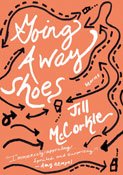Jill McCorkle's short story collection, "Going Away Shoes,"(Algonquin Books, $22.95, 2009), reads like a short soap opera. Narrated by a parade of middle-aged women sharing their fantasies and failures in love, the 11 stories host a typical cast of characters: damsels in despair, handsome devils and bored housewives. These are not stories about change, but rather of testing the limits of routine.
Many stories are bland simply because they are based on tired clichés that McCorkle fails to reinvent. For example, "Going Away Shoes," is about tensions over who will care for an elderly, infirm mother. The story's begins with this cliché; "Debby Tyler is a mythical stereotype." Yet despite this self-aware choice, McCorkle never delivers the twist that would make her story more compelling.
A few stories do have stronger flavor, such as "Another Dimension." After the main character's father dies, she returns to her childhood home. During her nostalgic visit, Ann relives and re-evaluates her childhood experiences from an adult perspective. Unlike other characters, Ann has a revelatory realization: "There is something in the damp darkness and familiar smell that brings an odd sense of comfort and the knowledge that there is nothing scarier than not being willing to look into the unknown."
With the exception of "Another Dimension," each story's theme is about people's high tolerance for stasis. In depicting routine as an inescapable magnet, McCorkle chooses particularly saccharine endings. For example, stories end with images of a character who "hears the familiar bell," or the assurance that "[s]he will fasten her seatbelt and not say a word."
McCorkle's exploration of middle-aged suburbanites leaves readers wondering when these routine stories will end.
Jill McCorkle will sign copies of "Going Away Shoes," Oct. 20, at 5:30 p.m. at Lemuria Books in Banner Hall.



Comments
Use the comment form below to begin a discussion about this content.